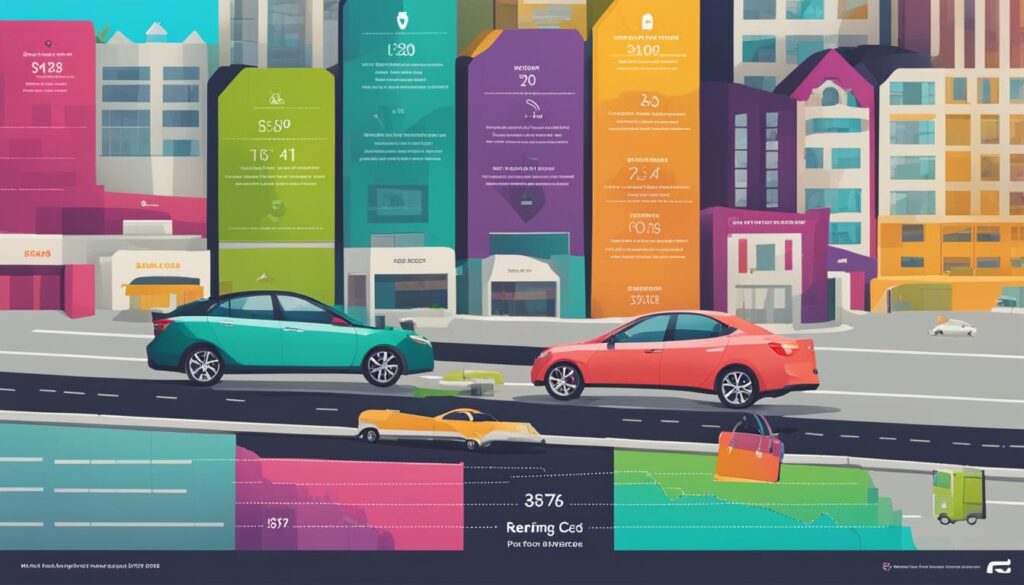As you plan your travels in the United States, one crucial decision to make is whether to rent a car or use a rideshare service to get around. Both options have their merits, so it’s essential to compare and contrast them carefully to determine which is the most cost-effective for your needs. In this article, we’ll conduct a detailed car rentals vs. rideshares cost analysis to provide you with a comprehensive view of the pricing factors involved in both modes of transportation.
Whether you’re interested in car rental prices or rideshare fares, we’ve got you covered with an in-depth look at the costs associated with each option. We’ll also explore other relevant facets like vehicle selection, insurance coverage, the impact on the environment, and more. By the end of this article, you’ll have all the information you need to make an informed choice about which travel mode is the right fit for you, based on your budget, distance, and other critical factors.
Understanding Car Rentals
When it comes to traveling, car rentals provide a host of advantages compared to other modes of transportation. Not only do they offer flexibility to explore your destination at your own pace, but they also provide convenience by eliminating the need to hail a cab or use public transportation.
In addition to these benefits, car rentals offer additional perks that make them a smart choice for many travelers. For instance, many rental companies provide 24/7 roadside assistance, ensuring peace of mind in case of emergency situations. Furthermore, some rental car companies offer loyalty programs and discounts, which can save you money if you rent cars frequently.
Overall, car rentals are a great option for those who value freedom, control, and comfort on their travels. In the next sections, we will compare car rental prices and benefits to those of rideshares, so you can make an informed decision about which mode of transportation is right for your needs and budget.
Exploring Rideshares
If you’re looking for an alternative to traditional transportation methods, rideshares may be the perfect solution. Rideshares offer a multitude of benefits, including:
- Affordability: Rideshares are often cheaper than taxi services and can be more cost-effective than owning and maintaining a personal vehicle.
- Ease of Use: With just a few taps on your smartphone, you can easily request a ride and track its progress in real-time.
- Convenience: Rideshares allow you to avoid the stress of driving and finding parking, making your commute or travel more relaxing and enjoyable.
If you are concerned about safety, many rideshare services offer additional features, such as driver background checks, real-time tracking, and two-factor authentication for added peace of mind.
Whether you need a ride to the airport, a night out on the town, or simply want to avoid driving in heavy traffic, rideshares are a convenient and affordable option. See the table below for a comparison of key features and advantages of rideshares:
Rideshare Advantages
| Advantages | Description |
|---|---|
| Cost-Effective | Rideshares are often less expensive than traditional taxis, especially for longer trips. |
| Convenient | You can easily summon a ride using your smartphone, without the need to hail a cab or drive yourself. |
| Efficient | Many rideshare services provide real-time tracking and advanced routing algorithms, optimizing your travel time and minimizing your carbon footprint. |
| Accessible | Rideshares are widely available throughout most urban and suburban areas, providing a flexible and convenient way to travel wherever you need to go. |
| Safe | Rideshare companies typically conduct background checks and permit requirements to ensure driver safety, with additional safety features such as two-factor authentication and real-time ride tracking. |
With these advantages, rideshares provide a practical and efficient way to travel, especially for people on a tight budget. As we move forward, it is likely that ridesharing will become more widespread and innovative, offering even more benefits to riders like you.
Comparing Car Rental Prices
If you’re considering renting a car for your next trip, it’s essential to have a clear understanding of the pricing factors involved. Here, we compare car rental prices, including daily rates, additional fees, and potential discounts, giving you the information you need before making any decisions.
| Rental Company | Daily Rate | Additional Fees | Potential Discounts |
|---|---|---|---|
| Enterprise | $40 | Fees for underage drivers, additional drivers, and fuel refills | Membership discounts or codes |
| Hertz | $50 | Fees for additional drivers, refueling, and roadside assistance | Membership discounts, loyalty programs, and promotional codes |
| Avis | $45 | Charges for adding a GPS or insurance, refueling, and roadside assistance fees | Deals offered for corporate memberships, partner promotions, and frequent renters |
Generally, car rental prices range from approximately $40-$50 per day, depending on factors such as the type of car and location. However, additional fees can add up quickly, including fees for underage drivers, additional drivers, fuel refills, refueling, roadside assistance, and GPS or insurance.
To ensure the best possible value, always check for potential discounts, such as membership discounts, loyalty programs, partnership promotions, corporate discounts, and promotional codes. Keep in mind that rental car prices can fluctuate based on season, location, and availability.
By comparing car rental prices and analyzing all costs associated with renting a car, you’re sure to make an informed decision that meets your travel needs and budget.
Understanding Rideshare Fares
Comparing car rentals and rideshares is not always straightforward as several factors come into play. One of these factors is rideshare fares.
Rideshare platforms calculate fares based on several factors such as:
| Factors | Description |
|---|---|
| Base fare | The initial cost of the ride. |
| Distance-based fee | The charges for each mile/kilometer traveled. |
| Surge pricing | The additional cost when rides are in high demand. |
| Tolls and fees | Charges for tolls and other fees such as airport fares. |
| Peak travel times | Rates may increase during high demand hours, such as rush hour. |
Surge pricing is a common pricing strategy used by rideshare companies. Surge pricing means that the fares can vary depending on the level of demand for rides. During peak periods, such as weekend nights or special events, the cost per mile or minute will go up. This pricing model helps ensure that drivers are available when demand is high, but it can be a disadvantage for riders as it can result in higher fares.
To avoid high rideshare fares, you can:
- Compare fares on different platforms.
- Take advantage of promotions and discounts offered by rideshare companies.
- Avoid traveling during peak hours or demand.
When comparing rideshare fares to car rental prices, it is necessary to factor in the frequency of rideshare usage. Frequent rideshare users may end up spending significantly more money than car rental users, despite the apparent cost difference between individual rides.
Now that we have explored rideshare fares, we can move on to comparing the cost efficiency of both car rentals and rideshares in the next section.
Assessing the Cost Efficiency
When it comes to determining the most cost-efficient travel option, comparing car rentals and rideshares is essential, taking into account variables such as trip distance, travel frequency, and accessibility. Overall, each option has its benefits and drawbacks depending on the specific circumstances of your travel needs.
Car rentals can be an excellent choice for longer trips or if you need to visit multiple destinations in a short period. However, if you’re only traveling a short distance, the daily rate and additional fees may make car rentals more expensive than other options.
Rideshares are an excellent choice if you’re traveling alone or only need to go a short distance. They’re often cheaper than car rentals, and you don’t need to worry about parking or finding your way around. However, if you’re traveling with a group of people or have lots of luggage, rideshares can become less cost-efficient.
When comparing prices, it’s essential to remember that rates can vary depending on the time of day, location, and demand. In some cases, the cost of a rideshare can be higher during peak hours or in busy areas, while car rental prices often stay the same regardless of the time of day or location.
In terms of overall cost efficiency, the best option depends on your travel needs and preferences. If you value time and convenience, rideshares may be more cost-efficient, while car rentals might be a better choice if you prefer flexibility and independence. Ultimately, the most cost-efficient option is the one that fits your needs without compromising on quality or comfort.
Considering Other Factors
While cost is a crucial consideration, there are other aspects to factor in when selecting between car rentals and rideshares. These include the unique advantages offered by each mode of transportation.
Vehicle Selection
Car rentals allow you to choose the vehicle that best meets your requirements. Whether you need a spacious SUV or a small and fuel-efficient car, rental companies offer a range of options. For long journeys or road trips, you can select a comfortable and well-equipped car that can accommodate all your needs. On the other hand, ridesharing services provide fewer options for vehicle selection, although they do offer luxury cars for some occasions.
Insurance Coverage
Car rental companies offer insurance coverage for their fleet, giving you peace of mind during your travels. However, you may need to purchase additional coverage depending on your insurance policy and the type of rental vehicle you choose. Ridesharing platforms also offer insurance coverage, although the level of coverage varies depending on the driver’s insurance and the stage of the trip.
Environmental Impact
One significant factor to consider is the environmental impact of your travel. Cars contribute to air pollution, greenhouse gas emissions, and traffic congestion, leading to various environmental and health problems. Ridesharing services such as Uber and Lyft aim to reduce the number of cars on the road and offer ride-sharing opportunities to decrease the environmental impact. However, renting a fuel-efficient car can also reduce your carbon footprint.
Comparing Vehicle Selection and Insurance Coverage
| Aspect | Car Rentals | Rideshares |
|---|---|---|
| Vehicle Selection | Wide range of options, including luxury cars | Limited options, with luxury cars offered on special occasions only |
| Insurance Coverage | Standard insurance coverage, with the option to purchase additional coverage | Insurance coverage offered, with limitations depending on the stage of the trip and the driver’s insurance |
In conclusion, while cost plays a significant factor when selecting between car rentals and rideshares, considering vehicle selection, insurance coverage, and environmental impact can help you make an informed decision.
Tips for Making Informed Choices
Deciding whether to rent a car or use a rideshare service can be a difficult decision and depends on many factors like your budget, flexibility, and travel needs. Here are some tips for making an informed decision:
Sit down and do the math
Calculate the costs of renting a car versus taking a rideshare. Include factors like distance, frequency of travel, rental fees, gas, parking, and any applicable promotions or discounts.
Consider the time and convenience factors
If you’re traveling in a city, using a rideshare might be faster and more convenient than renting a car. On the other hand, if you plan to visit rural areas or do some sightseeing, renting a car might be a better option as you’ll have more control over your schedule and itinerary.
Pick a reputable car rental company/rideshare service
Before choosing a car rental company or rideshare service, do some research to ensure they have a good reputation. Check out online reviews and ratings to see what other customers are saying. Look for a company that offers good customer service and provides support in case of any issues.
Take advantage of loyalty programs and promotions
If you plan to rent a car or use a rideshare service frequently, consider joining their loyalty programs to take advantage of discounts and perks. Look for promotions and deals that can help you save money on your trip.
By following these tips, you can make an informed decision about whether to rent a car or use a rideshare service. Remember to keep in mind the cost efficiency of both options and choose the one that best suits your travel needs and budget.
Conclusion
After analyzing the cost analysis of car rentals vs. rideshares, it is clear that both options have their pros and cons. Depending on your specific travel needs and budget, one option may be more suitable than the other.
If you are looking for flexibility, convenience, and the ability to explore new destinations on your own terms, car rentals may be the way to go. Additionally, car rentals provide additional benefits such as the ability to bring your pets along with you.
On the other hand, if you’re looking for an affordable and hassle-free transportation option, rideshares may be the better choice. Rideshares provide cost savings as you wouldn’t have to pay for parking and other fees associated with car rentals.
In conclusion, your preferred mode of transportation should be based on a thorough assessment of your individual travel requirements. We hope our cost analysis has provided you with valuable insights into the pros and cons of car rentals vs. rideshares cost analysis so you can make an informed decision.

















































